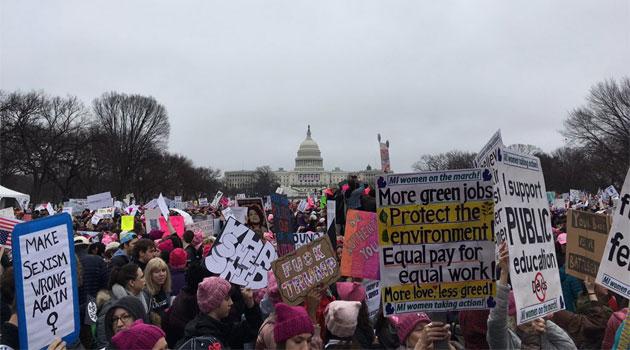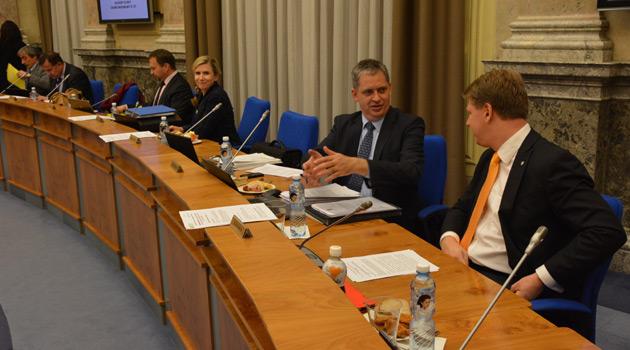US State Department reproaches Czech Republic over corruption, discrimination against Romani people

The Czech Republic is continuing to grapple with corruption, the social discrimination of Romani people, and the stigmatization of persons infected with HIV. Those are the findings for that country in the most recent annual report from the US State Department about the state of human rights in the world.
Excluded localities, low trust levels, and segregation of Romani people
The document about world events generally states that the degree to which human rights are being respected is deteriorating. Fundamental freedoms such as freedom of assembly and freedom of speech are mostly endangered.
The traditional annual report is based not just on data from last year, but also on incidents from 2015 and calls the Czech political system a stabilized democracy where the armed forces and security forces are under the effective control of the civilian authorities. As far as elections in the Czech Republic go, US diplomacy calls them free and fair.
However, Washington reproaches Prague annually over the problem of including its large Romani minority into society, which is estimated at 300 000 people. Insufficient involvement of Romani people is seen by the United States in Czech political life as well, although there are also Romani-profiled political parties in the country.
“No Romani people are members of Parliament, the cabinet, or the Supreme Court, and Romani candidates did not succeed in the regional elections,” the report notes. Right-wing extremists and some recent incidents involving them are also noted.
The report mentions, for example, the hacking of the website of the Czech Helsinki Committee and extremists’ calls for violence against individuals from nonprofit organizations. It also focuses on websites administered by extremists that are housed on servers abroad and that feature, for example, lists of the names of Romani activists.
The gravity of social exclusion is documented by the report, which mentions the expansion of so-called excluded localities and ghettos, where an estimated one third of all Romani people live, or last year’s remarks by Czech Vice Prime Minister and Finance Minister Andrej Babiš that the concentration camp for Romani people at Lety by Písek was actually just a work facility. Babiš later distanced himself from those words.
The Americans also report that a high number of Romani children attend “special primary schools” and that in practice a segregated education system has arisen as a result. The report also mentions a scandal from last August involving an armed man bursting into a building where Romani children attending a summer camp run by the musician Ida Kelarová were at the time.
Another case of Romani discrimination is mentioned by the report as follows: “In February a dentist who refused to treat a Romani man and his daughter was ordered by the court to apologize in writing and pay financial compensation.” A survey by the European Commission according to which just 29 % of Czechs said it would not bother them to work with a Romani person and only 11 % of Czech parents said they would not care if their child had a partner who was Romani was also mentioned.
Corruption, domestic violence, and poor conditions in detention facilities
The Czech Republic also needs to make progress in other areas, according to the USA, such as the lengthy detentions of asylum-seekers and immigrants in detention centers or overcrowding in the prisons. Nevertheless, the report acknowledges that the situation in detentions centers has improved thanks to a significant decline in immigrants entering the Czech Republic from Africa, Asia and the Middle East.
In connection with the migration crisis, which concerns primarily wealthier European countries, the American report references Czech NGO findings that the amount of hate speech against immigration as a phenomenon has grown. “Politicians including the Czech President, Vice Prime Minister, MPs, Senators and regional-level politicians across the political spectrum are using anti-immigrant rhetoric in which Muslims are the main target,” the US State Department has written.
The report also perceives corruption as a long-term problem that affects Czech Police structures. The document mentions the example of a former director of Litoměřice Prison, Tomáš Líbal, who was given a three-year suspended sentence for bribery and extortion.
The American report also states that many international and local NGOs work in the Czech Republic and that the Government does not interfere with their work, but collaborates with them. The Czech Public Defender of Rights, a post held currently by Anna Šabatová, occupies an apolitical position that is guaranteed and also has the financial resources it needs for its work.
The 30-page report focuses extensively on the question of equality of the sexes and acknowledges that Czech women fully participate in political life. The Americans consider a hidden problem to be that of violence against women, which happens behind closed doors in many households.
Many women, primarily immigrants, decided not to report such cases, including cases of rape, out of concern that society might condemn them or out of fear that they might lose their immigration status, even though Czech laws punish rape and other violent assault with several years’ imprisonment. The report says another persistent problem is the abuse and mistreatment of children.
The document refers to a study conducted by NGOs that estimates violence is experienced in some form by 40 000 children in the Czech Republic annually. The Americans note that in the Czech Republic a child is automatically considered a victim of domestic violence even when the person directly suffering the violence is, for example, the child’s mother.
The report on the state of human rights in the world is published by the US State Department every year. This year, however, the publication has not been introduced to the public by the Secretary of State personally, as is the traditional custom, which has sparked criticism by NGOs and some legislators who are concerned that the United States no longer intends to continue its vocal criticism of undemocratic practices.
